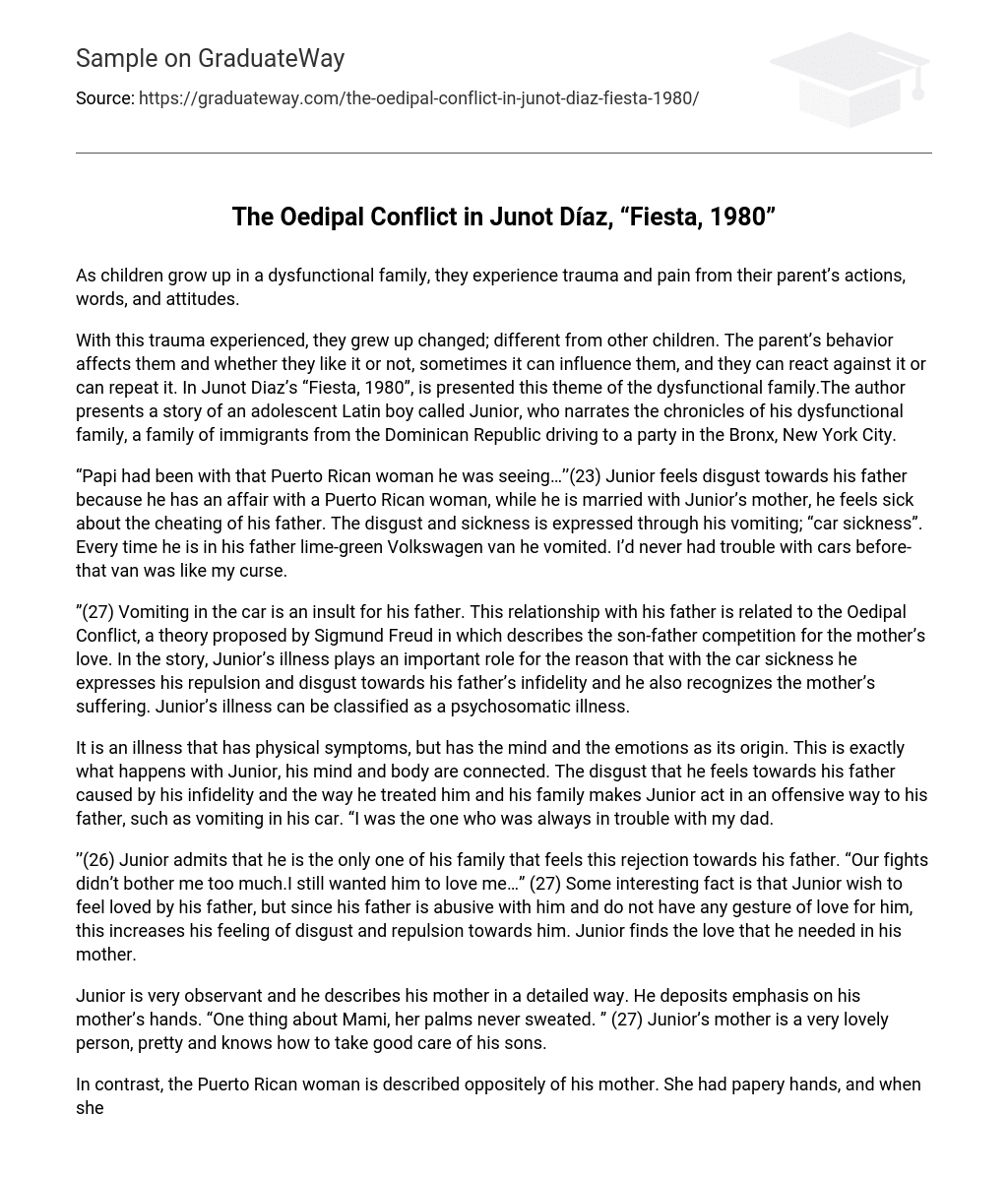As children grow up in a dysfunctional family, they experience trauma and pain from their parent’s actions, words, and attitudes.
With this trauma experienced, they grew up changed; different from other children. The parent’s behavior affects them and whether they like it or not, sometimes it can influence them, and they can react against it or can repeat it. In Junot Diaz’s “Fiesta, 1980”, is presented this theme of the dysfunctional family.The author presents a story of an adolescent Latin boy called Junior, who narrates the chronicles of his dysfunctional family, a family of immigrants from the Dominican Republic driving to a party in the Bronx, New York City.
“Papi had been with that Puerto Rican woman he was seeing…’’(23) Junior feels disgust towards his father because he has an affair with a Puerto Rican woman, while he is married with Junior’s mother, he feels sick about the cheating of his father. The disgust and sickness is expressed through his vomiting; “car sickness”. Every time he is in his father lime-green Volkswagen van he vomited. I’d never had trouble with cars before- that van was like my curse.
”(27) Vomiting in the car is an insult for his father. This relationship with his father is related to the Oedipal Conflict, a theory proposed by Sigmund Freud in which describes the son-father competition for the mother’s love. In the story, Junior’s illness plays an important role for the reason that with the car sickness he expresses his repulsion and disgust towards his father’s infidelity and he also recognizes the mother’s suffering. Junior’s illness can be classified as a psychosomatic illness.
It is an illness that has physical symptoms, but has the mind and the emotions as its origin. This is exactly what happens with Junior, his mind and body are connected. The disgust that he feels towards his father caused by his infidelity and the way he treated him and his family makes Junior act in an offensive way to his father, such as vomiting in his car. “I was the one who was always in trouble with my dad.
’’(26) Junior admits that he is the only one of his family that feels this rejection towards his father. “Our fights didn’t bother me too much.I still wanted him to love me…” (27) Some interesting fact is that Junior wish to feel loved by his father, but since his father is abusive with him and do not have any gesture of love for him, this increases his feeling of disgust and repulsion towards him. Junior finds the love that he needed in his mother.
Junior is very observant and he describes his mother in a detailed way. He deposits emphasis on his mother’s hands. “One thing about Mami, her palms never sweated. ” (27) Junior’s mother is a very lovely person, pretty and knows how to take good care of his sons.
In contrast, the Puerto Rican woman is described oppositely of his mother. She had papery hands, and when she rubbed the towel on my chest, she did it hard, like I was a bumper she was waxing. ”(35) According to Junior, the Puerto Rican woman is careless and is not lovely as his mother. This increases his disgust towards his father for being with such a woman that will never be like his mother.
This fact supports the idea that his son-father relationship is related to the Freud’s Oedipal Conflict. Junior’s father is a complex character. In the story, he is presented as a controlling, authoritative and dominant person, but sometimes in the story it seems that there is more about him. When we are alone he treated me much better, like maybe I was his son or something.
”(35) Juniors’ father was not so bad with his sons and he takes time to pass with them; but this is not enough to Junior. He feels unloved and alone, although the only one in his dysfunctional family that makes him feel differently is his mother. ” She put her hand on mine and said, Is everything OK, Yunior? (42) Junior’s mother is the only one in the family that cares about what is going on with his son; therefore Junior feels the necessity of giving to his mother the love that his father did not give. This is an extremely tense father-son relationship.
Teenagers like Junior need the father figure to receive love, attention and nurturing that a young boy need. The father figure is very important; he is an example to follow for the sons but when this father-son relationship is lacking there is no communication about dreams, wishes or hopes. There is no body to share feelings or show emotions; there is nobody to teach moral values. The sons did not learn the meaning of love and they grow up in an atmosphere of pain, distrust and rejection.
This is what happens with Junior; he does not have the father-son relationship that he wish he could have with his father.Therefore, Junior feels resentment towards his father for not being there with him in the moments he needs it, for being violent and adulterous. With his illness he expresses his disgust and competes for his mother love, which is the only one in the family that is always with him. In this case the reader could think that this Oedipal Conflict was originated because of his father conduct towards him and his mother, it is not because he hates his father and that is why he acts in that way.
This is a series of feelings towards his father that provokes this Oedipal Conflict in their relationship expressed in his illness.





